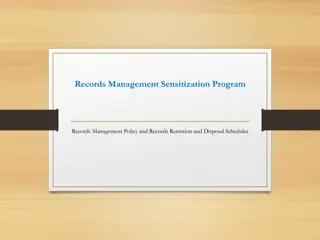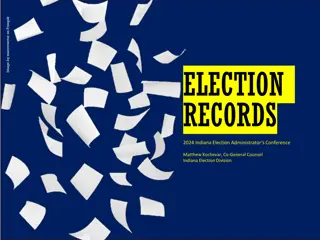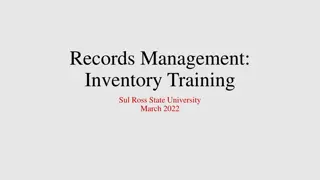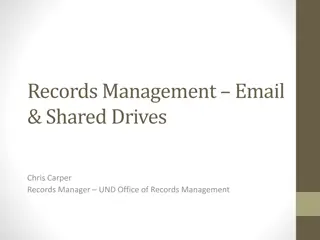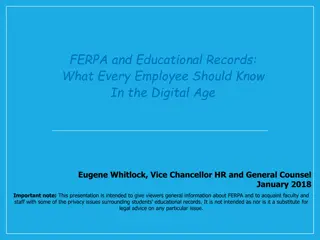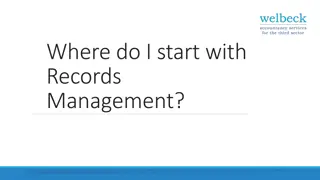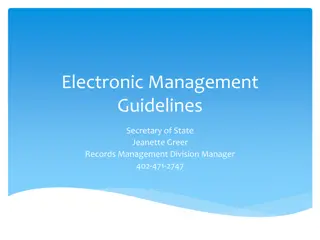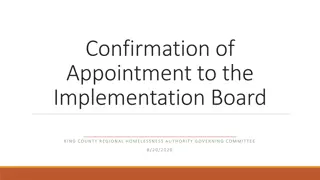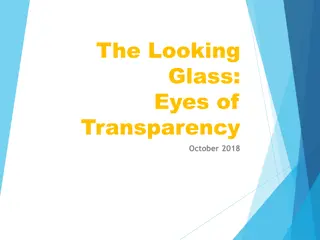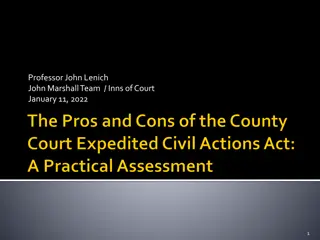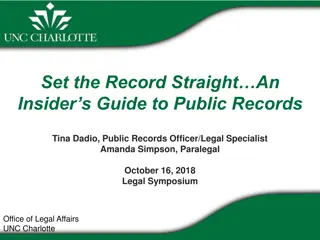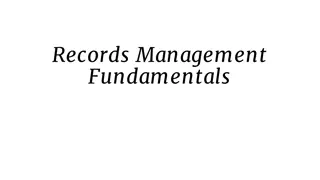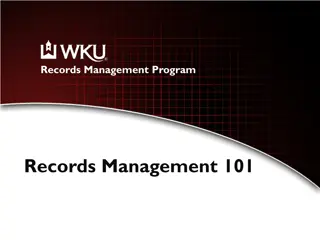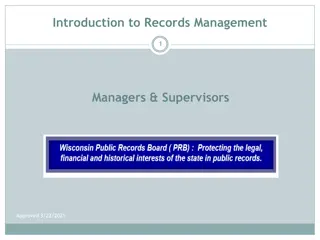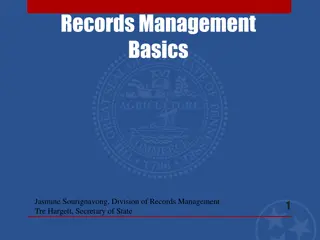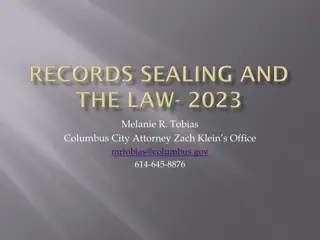Understanding the Public Records Act in King County
The Public Records Act in King County emphasizes the people's sovereignty and their right to access governmental records. It defines public records, explains the meaning of writing, and lists various types of records. The content also covers the format of requests and the legal obligations of agencies upon receiving requests.
Download Presentation

Please find below an Image/Link to download the presentation.
The content on the website is provided AS IS for your information and personal use only. It may not be sold, licensed, or shared on other websites without obtaining consent from the author. Download presentation by click this link. If you encounter any issues during the download, it is possible that the publisher has removed the file from their server.
E N D
Presentation Transcript
THE PUBLIC RECORDS ACT RCW 42.56 King County Public Records Office
THE INTENT OF THE PEOPLE The people of this state do not yield their sovereignty to the agencies that serve them The people have not given public employees the right to decide what is good for people to know and what is not good for them to know This chapter shall be liberally construed and its exemptions narrowly construed to promote this public policy and to assure that the public interest will be fully protected
WHAT IS A PUBLIC RECORD? Any writing Relating to the conduct/performance of any governmental or proprietary function Prepared, owned, used or retained by any state or local agency
HOW IS WRITING DEFINED? Writing means handwriting, typewriting, printing, photostating, photographing, and every other means of recording any form of communication or representation including, but not limited to, letters, words, pictures, sounds, or symbols, or combination thereof, and all papers, maps, magnetic or paper tapes, photographic films and prints, motion picture, film and video recordings, magnetic or punched cards, discs, drums, diskettes, sound recordings, and other documents including existing data compilations from which information may be obtained or translated. RCW 42.56.010(3)
TYPES OF RECORDS Paper/Hardcopy Records Electronic Records Letters Faxes Notes Emails Word Documents Spreadsheets Agendas PDFs Calendars Photographs Meeting Minutes Contracts Public Comment Forms Ordinances Videos Databases
FORMAT OF THE REQUEST: Public disclosure requests do NOT have to be in writing Look for language such as: public records request / public disclosure request Freedom of Information Act Request or FOIA formal records requests Be aware of hidden requests
LEGAL OBLIGATIONS ONCE A REQUEST IS RECEIVED Agencies are required to promptly make available for inspection and copying all identifiable public records unless the record falls within the specific exemptions of the Act or another statute. RCW 42.56.070 Agencies shall provide the fullest assistance to requestors. RCW 42.56.100 A response is required in writing within five business days. RCW 42.56.520
THE 5-DAY RESPONSE LETTER MUST: Provide the requested records; or Provide the internet address and link on the agency s web site to the specific record(s) requested; or Acknowledge the request and provide a reasonable estimate of the time needed to respond; or Deny the request in accordance with the law.
THE PUBLIC RECORDS ACT DOES NOT REQUIRE RESPONDING AGENCIES TO: 1. Create records, or 2. Respond to requests for information, or 3. Explain records
REQUESTORS NOT REQUIRED TO PROVIDE THEIR NAME OR STATE THEIR USE OR PURPOSE, EXCEPT: In order to determine whether the requestor is going to use a requested list of individuals for a "commercial purpose." RCW 42.56.070(9). When records are only available to certain individuals (medical records, autopsy reports, etc.)
AGENCYS OBLIGATIONS WHEN REDACTING OR EXEMPTING RECORDS: The responding agency must identify each record withheld or redacted, and the legal justification for doing so. Even if an agency is entitled to withhold a record, if the requestor is not provided with a justification for the non-disclosure, the agency will be liable if the requestor sues for a violation of the PRA. Citizens for Fair Share v. Dept. of Corrections, 117 Wn. App. 411, 72 P.3d 206 (2003). If only a portion of a document is exempt, the responding agency must redact that portion and release the remainder of the document.
ARE THE REQUESTED RECORDS SUBJECT TO DISCLOSURE? Whether a document or a portion thereof is exempt from disclosure will depend on the nature of the document and whether an exemption in the PRA or other statute applies. In making such a determination, remember that exemptions are narrowly construed in favor of the requestor. The exemptions listed below are by no means exhaustive and the Prosecuting Attorney s Office should be consulted when any questions arise about whether a record may be exempt from disclosure.
WITHHOLDING INDEX A claim of exemption should be in the form of a withholding index (sometimes called a privilege log) in order to trigger the one year statute of limitations. Rental Housing Ass n of Puget Sound v. City of Des Moines, 165 Wn.2d 525, 199 P.3d 393 (2009).
EXEMPTIONS: ATTORNEY CLIENT PRIVILEGE Exempts a client s request for legal advice, legal advice the lawyer provides, and the client s questions about that advice. The client must intend for the communication to be confidential. Does not exempt client records just because the lawyer is cc d.
EXEMPTIONS: PERSONNEL/PERSONAL RECORDS All applications forpublic employment, including the names of applicants, resumes and other related materials submitted with respect to an applicant. RCW 42.56.250(2) The residential addresses, residential telephone numbers, personal cell phone numbers, personal e-mail addresses, social security numbers and emergency contact information of employees or volunteers of a public agency. Names and dates of birth are exempt for dependents of employees and volunteers, but they are not exempt for employees and volunteers.
RISKS ASSOCIATED WITH FAILURE TO COMPLY WITH THE PRA If requestor prevails in a court case, they are entitled to MANDATORY penalties of $5-$100 per day, plus attorney s fees. Strict liability standard; no exceptions for acting in good faith. Statute of limitations for bringing legal action is one year from agency s claim of exemption or the last production of a record on a partial or installment basis.
WHOS RECORDS ARE THEY? The citizens of the state of Washington own them. "All public records shall be and remain the property of the state of Washington. They shall be delivered by outgoing officials and employees to their successors and shall be preserved, stored, transferred, destroyed or disposed of, and otherwise managed, only in accordance with the provisions of this chapter. RCW 40.14.020
RECORDS WITH RETENTION VALUE Record County functions and provide evidence of County business transactions Are needed to provide information about actions related to County projects and activities Must be available and accessible for at least the full length of their retention period Retained based on content of record not type of record
TRANSITORY RECORDS Used to complete a routine action or to prepare a subsequent record Have a short or no retention period Not needed to document decisions/actions of your office Not required for legal, fiscal, historical or administrative purposes Still subject to litigation and public disclosure if they have not been destroyed
RETENTION PERIODS Communications 2 years Agenda Packets (includes all referenced and attached documents) 3 years Minutes (includes all reference and attached documents) 6 years Reports 6 years




